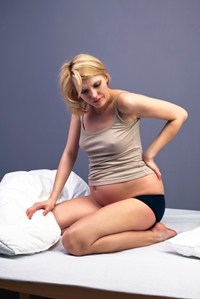Now that you're getting ready for baby, you might have noticed that aches and pains abound every time you bend or move certain parts of your body. Whether it's in your knees, ankles, fingers, wrists or back, joint pain is certainly no picnic. However, once you know what's causing this discomfort, you can usually take steps to alleviate it. Here are a few of the most common factors responsible for joint pain during a pregnancy.
1. Hormonal changes. The hormone called Relaxin does just that – it relaxes your ligaments, allowing them to lengthen to accommodate your growing baby, but it can also stress your joints. While there's nothing you can do to inhibit the hormone, it might help to tone up. Because your ligaments won't be supporting your joints as well, your muscles will have to take over. Do some light exercises designed to work the areas where you feel the most pain.
2. Weight gain. The added weight you put on while pregnant can cause extra strain on your joints – especially those in your pelvic region and your knees. It's important to ensure that you're putting on the appropriate number of pounds in order to support your growing baby. You can benefit from regular exercise and eating a healthy diet so the amount on the scale doesn't skyrocket.
3. Nutritional deficiency. If you're not getting the right amount of vitamins and minerals for you and your baby, you could experience side effects like aching muscles and joints. To make sure you're taking in everything you need, eat plenty of fruits, vegetables, lean proteins and whole grains – and be diligent with those prenatal vitamins!
When you experience joint pain, it's usually okay to take a bit of Tylenol as needed, but it might also help to get some extra rest and elevate your feet.
